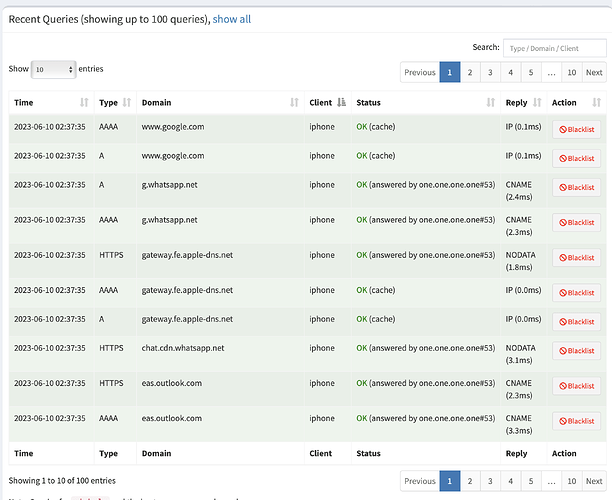How did you configure your Wireguard connection?
I used this
If you do configure a full IPv4/IPv6 tunnel wireguard tunnel, and an IPv6 DNS server along with it, clients would use it.
As far as I can tell, it isn't full tunnel. The Wireguard peers (and firewall rules) are configured to only forward DNS queries between peers and the server.
As you see IPv6 clients in your Pi-hole's log, that would imply that you did configure one of your Pi-hole's IPv6 addresses as DNS server.
Yes. Every peer's (i.e. client's) config file has their DNS servers set to server's IPv4 and IPv6 address.
As client's are not aware of an IPv6 DNS server address, they would use the remaining IPv4 address for DNS.
I think the clients are aware of server's IPv6 address. Unless Pi-Hole isn't configured to be used as DHCP server + workaround, there's no easy way for clients (let's say one of the clients is a smartphone, and there are two apps: one of the apps uses IPv6 routing i.e. backlinks and DNS requests made via this app is solely via IPv6, while the other app hasn't adopted IPv6 standard yet, which means all the DNS queries would be IPv4 in nature) ... ... ... between the DNS queries made by these two apps from the same client, both the Query Log and Dashboard would treat them as two different devices.
If one is not to use Pi-Hole as DHCP server, the only other way is this, which is a bit broken, but it still does the job.
On a side-note: I'm gonna try and answer my own question,
My question is - what would happen to those IPv6 DNS requests? (since Pi-Hole is only configured as IPv4 DNS resolver)
At least when my home router was configured as DHCP server, and I had both PPPoE IPv4 and IPv6 routing, even when the router's DHCP server was IPv4, all IPv6 DNS queries were forwarded to the DNS server configured for IPv4 (DHCP LAN settings). Maybe this might being some insight to others, who would be fumbling with a similar experience.
